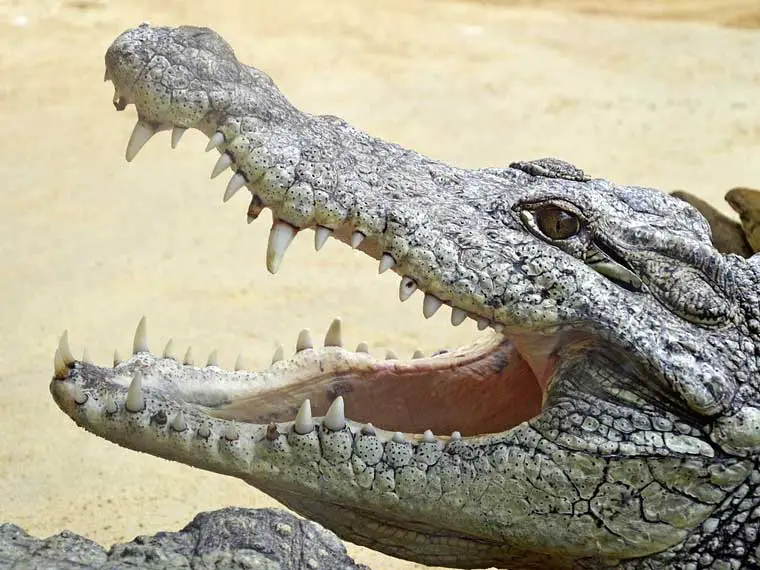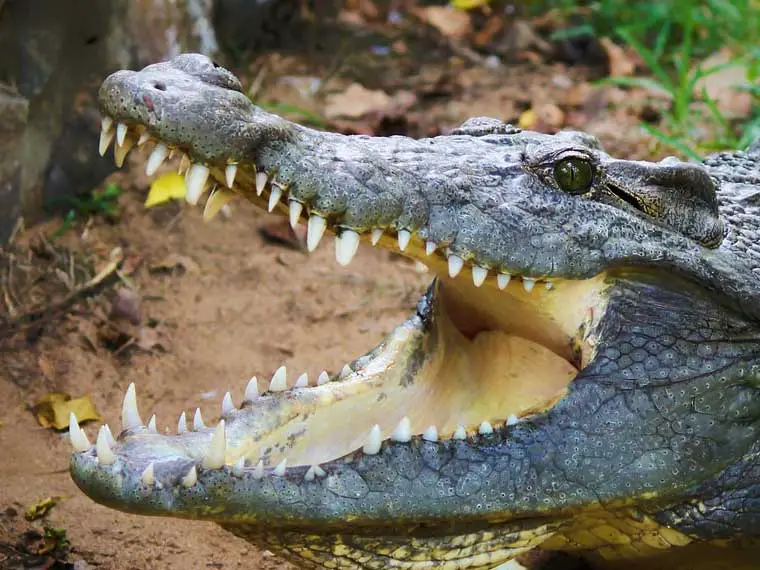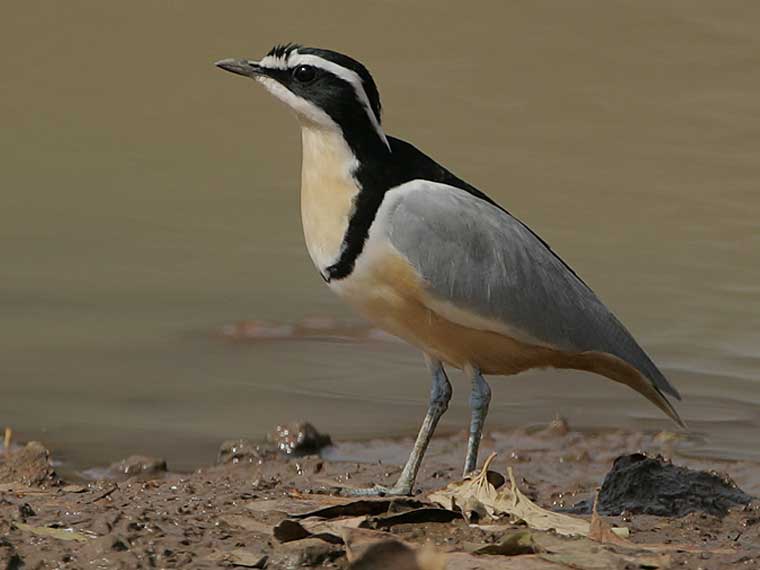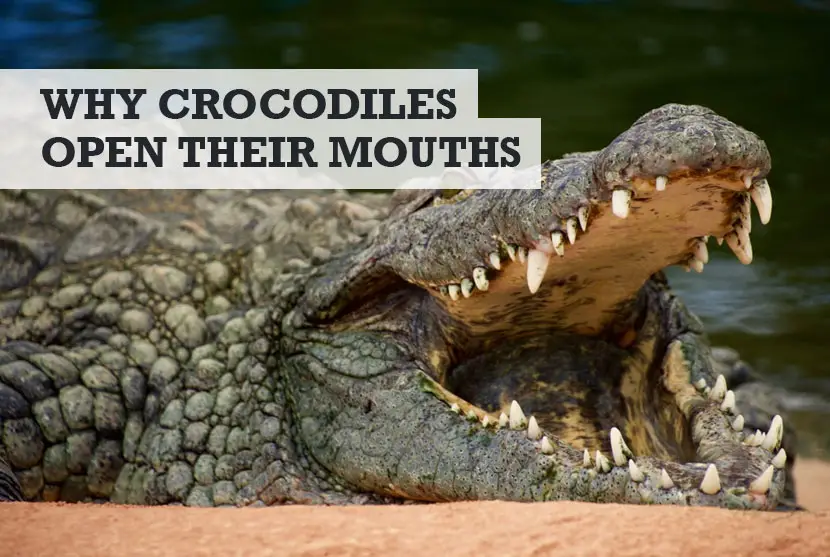If you’ve seen crocodiles in a zoo, you’ve probably noticed that they spend a lot of the time sitting with their mouths wide open. Strangely enough, it’s not just captive crocodiles that leave their mouth open. Wild crocodiles also exhibit this behavior while resting on riverbanks in countries such as Africa and Asia.
Why do crocodiles open their mouths? Crocodiles keep their mouths open to release heat. This stops them overheating in the sun and is an effective way for them to cool down. It’s not too dissimilar to how dogs pant. Crocodiles also open their mouths to let teeth-cleaning birds get to work.
People often mistake it for a yawn.

Crocodiles are also observed leaving their mouths open during the night too and when it rains. This suggests there could be a social function to this behavior as well, and not just the main reason of cooling down.
So, that’s the main reason why crocodiles open their mouths while resting. However, below you will find more information about why this behavior is so necessary to crocs, as well as other related topics.
Why crocodiles leave their mouth open
Crocodiles, as well as other species of crocodilians such as alligators, caimans, and gharials, are cold-blooded and ectothermic. This means that they are unable to generate heat inside their bodies in the same way as other animals do.
What they do instead is raise their body temperature by basking in the sun for long periods to survive. In fact, the average crocodile spends most of its day doing this, only leaving to hunt sporadically from time to time, usually during the night.
A crocodile’s skin is designed in such a way that it can absorb heat with ease, as well as retain it for hours on end. However, this, unfortunately, also has a negative ramification. Crocodiles cannot sweat, and as a result, they will overheat and perish if the weather becomes extremely hot.
To combat this, they will either take a dip, move to a shaded area, or crocodiles will open their mouths and release heat. Although not quite the same, crocodiles can pant (or sweat) through their mouths much like canines.

Why do crocodiles sleep with their mouths open?
It’s not entirely clear why crocodiles sleep with their mouths open at night or a daylight nap. It’s not a crocodile yawning though. However, as touched on before, they typically do this to cool down, often during warm summer nights and not just during the daylight hours.
Many scientists believe this behavior could also have something to do with social cues between the animals, although this hasn’t been proven.
Handy Hint: Contrary to what you might have heard, crocodiles do not sleep underwater.
Why do crocodiles open their mouth after eating?
In certain areas of the world, namely Egypt and Africa, crocodiles can commonly be observed opening their mouths directly after having consumed a meal. This is because they have developed a special and rather unique relationship with Egyptian Plovers, a colorful and clever species of bird belonging to the shorebird family.

Incredibly, these tiny birds will climb into the crocodile’s mouths, and pick out any scraps of meat that are caught between the huge reptile’s teeth. The plovers are rarely in danger and will go about their business without worrying about the crocs snapping their jaws shut. On the flip side, the crocodiles get their teeth cleaned something they are unable to do themselves.
Egyptian plovers and crocodiles have a unique symbiotic relationship. Because crocodiles cannot use dental floss, they get food stuck in their teeth. … The bird recognizes this invitation, and if one is nearby it will fly into the mouth of the crocodile, eat the food stuck in its teeth, and fly away.
Can crocodiles open their mouths underwater?
If you live in a country where crocodiles are widespread, the chances are you’ve probably heard (either from a friend or family member) how crocodiles cannot open their mouths when submerged underwater.
However, this is a widespread myth and isn’t true. In fact, crocodiles have no trouble opening their mouths underwater because they have developed a special valve at the back of their throat that stops water from entering.
This means that crocodiles can pursue prey such as fish and turtles without risking drowning or choking on water in the process.
Contrary to this rather harmful belief, most crocodile attacks actually take place in rivers and other bodies of water, often when the crocodile is completely submerged, and the helpless victim is unable to spot them when fishing or swimming.
The crocodile’s skin color, a mixture of different shades of green and brown, allows it to blend in with the water, mud, and reeds and approach people without being detected.
Can you stop a crocodile from opening its mouth?
Crocodiles are renowned for their incredible jaw strength. In fact, the saltwater crocodile has the strongest bite in the animal kingdom, measuring at a hefty 3,700 pounds per square inch, almost 4 times that of hyenas, lions, and tigers.
Additionally, smaller species of crocodiles can easily bite through steel, thus making short work of almost any medium-sized animal.
However, despite this, crocodiles have a weakness that can easily be taken advantage of: the muscles that open their mouths are exceptionally weak compared to the ones they use to close it.
In general, the average adult could hold a crocodile’s mouth closed without any trouble (although, I wouldn’t recommend trying it).
Incredibly, a rubber band is often enough to keep a crocodile’s mouth closed, and experts will often use items like these (as well as tape and other similar materials) when relocating or rescuing crocodiles.
Handy Hint: Crocodiles and alligators are very similar in appearance but won’t be able to breed with each other, here’s why.
Why do crocodiles cry when eating?
In certain countries, it is a common belief that crocodiles and other crocodilian species cry when consuming their prey. But is this actually true?
Interestingly, crocodiles do in fact “cry” when they tuck in for a meal but this phenomenon isn’t caused by remorse as books such as Shakespeare’s Othello would have you believe. Instead, experts suggest that the tears are indirectly caused when crocodiles hiss and make other similar vocalizations while eating.
This naturally pushes air through the sinuses and causes the glands in their eyes to produce tears. However, research is still ongoing, as other crocodile experts have different theories about what causes these tears.
For example, some believe the tears are a mechanism to protect their eyes from damage when tackling large and aggressive prey.
Conclusion
In wildlife documentaries, you can usually spot a crocodile or two in the background showing their pearly whites. The reasons for crocodiles always having their mouths open has been debated for years, so I am glad I managed to get to the bottom of it today!
You might also like…
- Hippos versus crocodiles
- Crocodiles jumping out of the water and into boats
- Can crocodiles be tamed and domesticated?
Image in header via https://unsplash.com/photos/R3sgrDvXz3I

